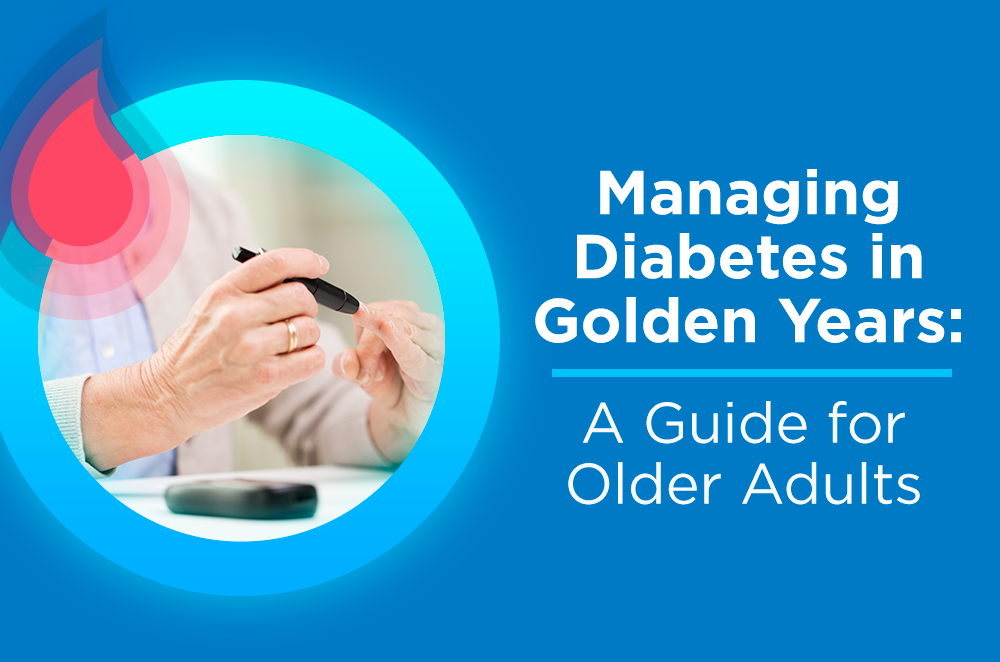Aging is a natural part of life, and with it often comes a greater risk of challenges, including diabetes. In fact, diabetes in older adults is a prevalent and growing concern, but it’s one that can be managed effectively with the right knowledge and care. In this blog post, we’ll explore the unique aspects of diabetes in older adults, and its challenges, and provide essential tips for managing this chronic condition during the golden years.
Understanding Diabetes in Older Adults
Diabetes doesn’t discriminate by age. Older adults can have either type 1 or type 2 diabetes, though type 2 diabetes is more common among this demographic. The risk factors for diabetes in older adults include genetics, age, and lifestyle factors, with family history and being overweight playing significant roles.
Challenges of Diabetes in Older Adults
Managing diabetes in later life presents several distinct challenges:
- Polypharmacy: Older adults often take multiple medications for various health conditions, which can complicate the management of diabetes medications and increase the risk of drug interactions.
- Cognitive Decline: Cognitive decline can impact a person’s ability to manage diabetes effectively, affecting their ability to remember medication schedules and dietary guidelines.
- Physical Limitations: Mobility issues and physical limitations can make regular exercise and meal preparation more challenging, making it crucial to adapt diabetes management strategies.
- Social Isolation: Older adults are more susceptible to social isolation, which can have a detrimental effect on their emotional well-being and support networks, making emotional support and motivation even more critical.
Tips for Managing Diabetes in Older Adults
Here are a few tips to help manage diabetes:
- Regular Monitoring: Consistent blood glucose monitoring is essential. Older adults should collaborate closely with their healthcare team to establish a monitoring schedule that aligns with their specific needs.
- Medication Management: A thorough understanding of diabetes medications, including dosages and potential interactions with other medications, is vital for effective management.
- Diet and Nutrition: A balanced, nutritious diet plays a pivotal role in diabetes management. Collaborating with a registered dietitian to create a diabetes-friendly meal plan can be highly beneficial.
- Physical Activity: Encourage physical activity, even in small amounts. Gentle exercises like walking or chair exercises can help maintain mobility and manage blood sugar effectively.
- Social Support: Combat social isolation by connecting with friends, family, or support groups. A strong social network provides emotional support and motivation, which are particularly important for older adults.
- Mental Health: Prioritize mental health. Managing diabetes can be emotionally challenging, so it’s essential to seek support from a mental health professional if needed.
- Regular Check-Ups: Attending regular check-ups with healthcare providers is vital to monitor diabetes and address any health concerns promptly.
Managing diabetes in older adults is a multifaceted challenge, but with the right knowledge, support, and lifestyle adjustments, it is possible to lead a fulfilling and healthy life during the golden years while living with diabetes. You’re not alone on this journey. If you are someone living with diabetes, CCMH offers diabetes education to help those navigate through diagnosis and different management styles. By making proactive choices and seeking help when needed, older adults can continue to enjoy a high quality of life as they age gracefully with diabetes.
Resources:
https://www.nia.nih.gov/health/diabetes-older-people
https://www.healthinaging.org/tools-and-tips/ask-expert-managing-diabetes-older-adults
https://www2.diabetes.org/healthy-living/seniors
Disclaimer
The Comanche County Memorial Hospital website does not provide specific medical advice for individual cases. Comanche County Memorial Hospital does not endorse any medical or professional services obtained through information provided on this site, articles on the site or any links on this site.
Use of the information obtained by the Comanche County Memorial Hospital website does not replace medical advice given by a qualified medical provider to meet the medical needs of our readers or others.
While content is frequently updated, medical information changes quickly. Information may be out of date, and/or contain inaccuracies or typographical errors. For questions or concerns, please contact us at contact@ccmhhealth.com.

